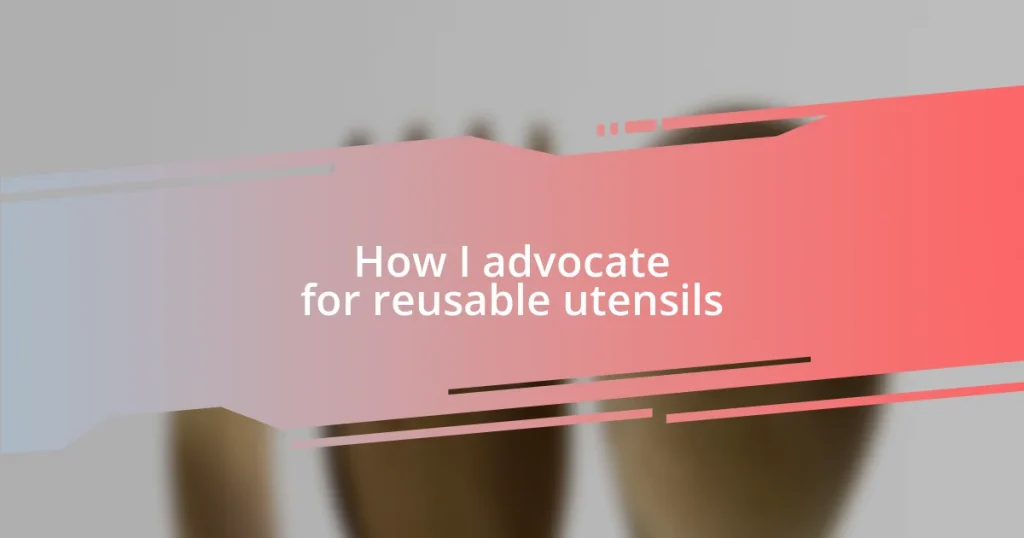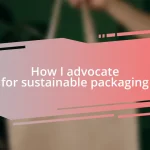Key takeaways:
- Transitioning to reusable utensils not only reduces plastic waste but also fosters conversations about sustainability and encourages collective responsibility within communities.
- Using reusable utensils offers personal and environmental benefits, including waste reduction, durability, cost-effectiveness, and promoting healthier dining choices.
- Successful advocacy for sustainability can be seen through community events and initiatives, where individuals engage with and inspire others to adopt eco-friendly habits, creating a ripple effect of positive change.
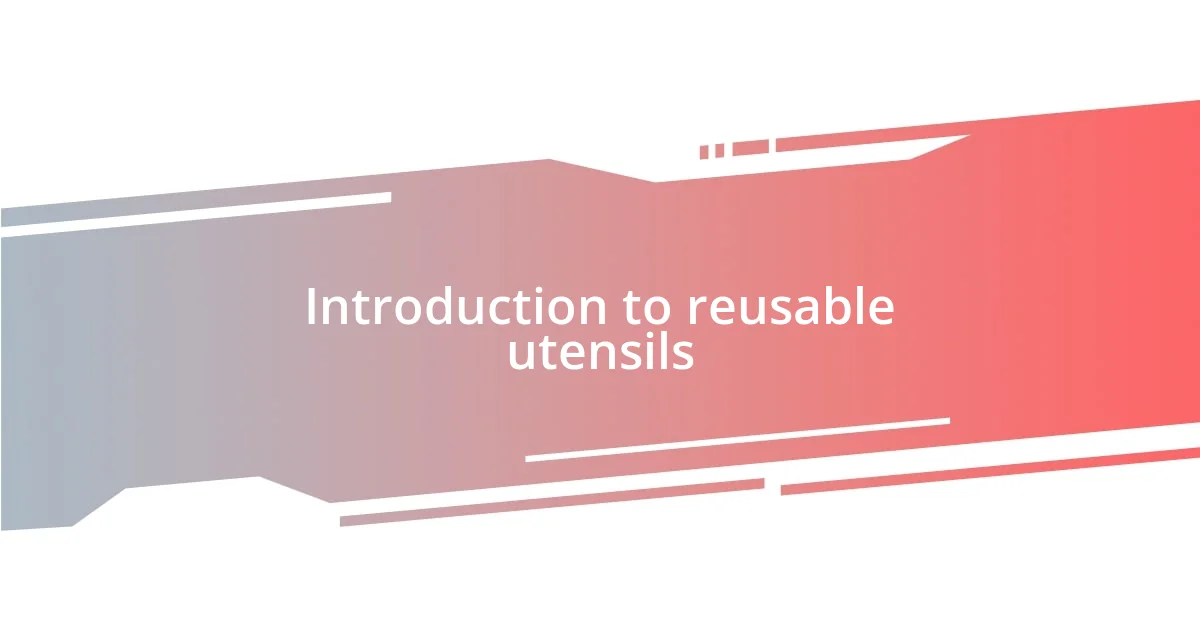
Introduction to reusable utensils
Let me share why reusable utensils have become an essential part of my daily life. I still remember the first time I pulled out my reusable fork at a picnic and felt a wave of pride wash over me. It struck me how small changes can create a ripple effect for our environment. Have you ever thought about how many plastic utensils are tossed away every day, after just one use?
Transitioning to reusable utensils isn’t just a trend; it’s a mindset shift. Each time I reach for my stainless-steel or bamboo spoon, I can’t help but feel a little more connected to the earth. It’s like a reminder that my choices matter. It’s empowering to know that even in a small way, I am contributing to a larger movement towards sustainability. How does making that switch feel for you?
I often find that using reusable utensils sparks conversations, turning meals into moments of advocacy. Friends ask why I bother, and I love sharing the impact of reducing waste on our planet. Have you had any experiences where simply using different materials opened doors for dialogue? It reminds me that we can inspire those around us with our choices, one meal at a time.
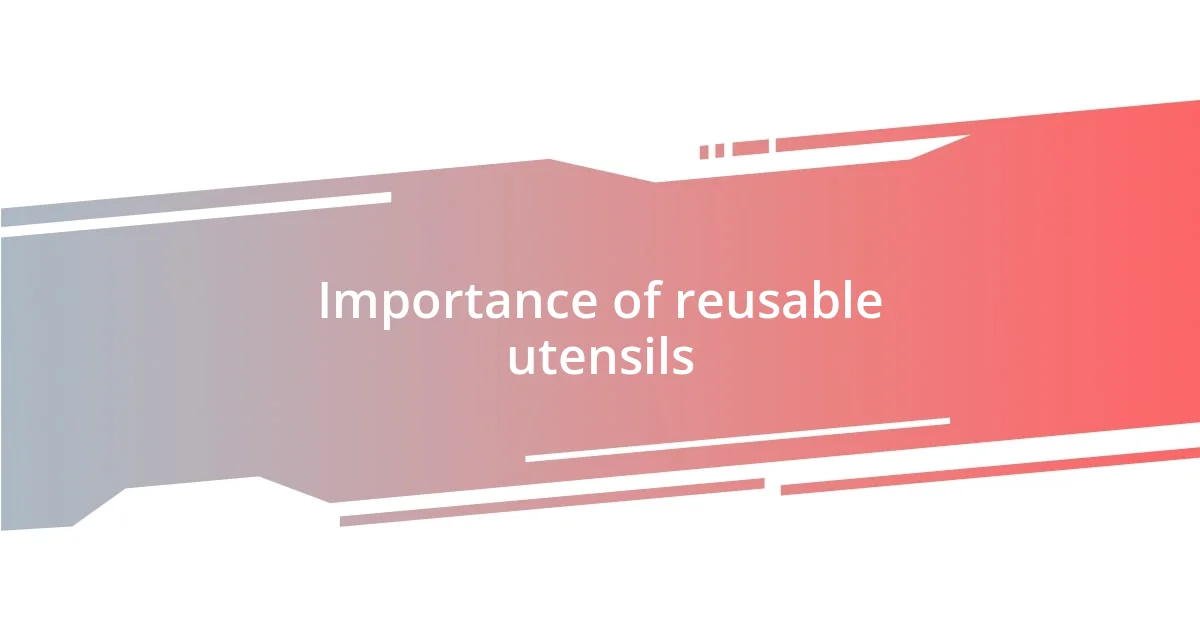
Importance of reusable utensils
Reusable utensils play a vital role in minimizing plastic waste. Each year, billions of plastic utensils find their way into landfills and oceans, contributing significantly to environmental degradation. Sometimes, I imagine what our planet would look like without the constant influx of single-use plastics. It gives me a nudge to keep advocating for sustainable choices.
Moreover, using reusable utensils often shifts the way we think about consumption. I vividly recall a dinner I hosted where my guests were surprised to find an entirely waste-free table setting. They were amazed that something as simple as switching out plastic forks could make such a statement about our values and priorities. It’s incredible how choosing a durable material can evoke conversations around eco-consciousness.
On a more personal note, transitioning to reusable utensils felt like a commitment to my lifestyle. The moment I began carrying a set in my bag, I felt a sense of responsibility. Rather than being a hassle, they became a badge of honor—a tangible way to contribute to a healthier planet. It’s a small change, but I find it profoundly rewarding to know that every meal can be a step toward sustainability.
| Reusable Utensils | Single-Use Plastics |
|---|---|
| Durability | Short-lived |
| Eco-Friendly | Pollutive |
| Cost-effective in the long run | Continuous expenses |
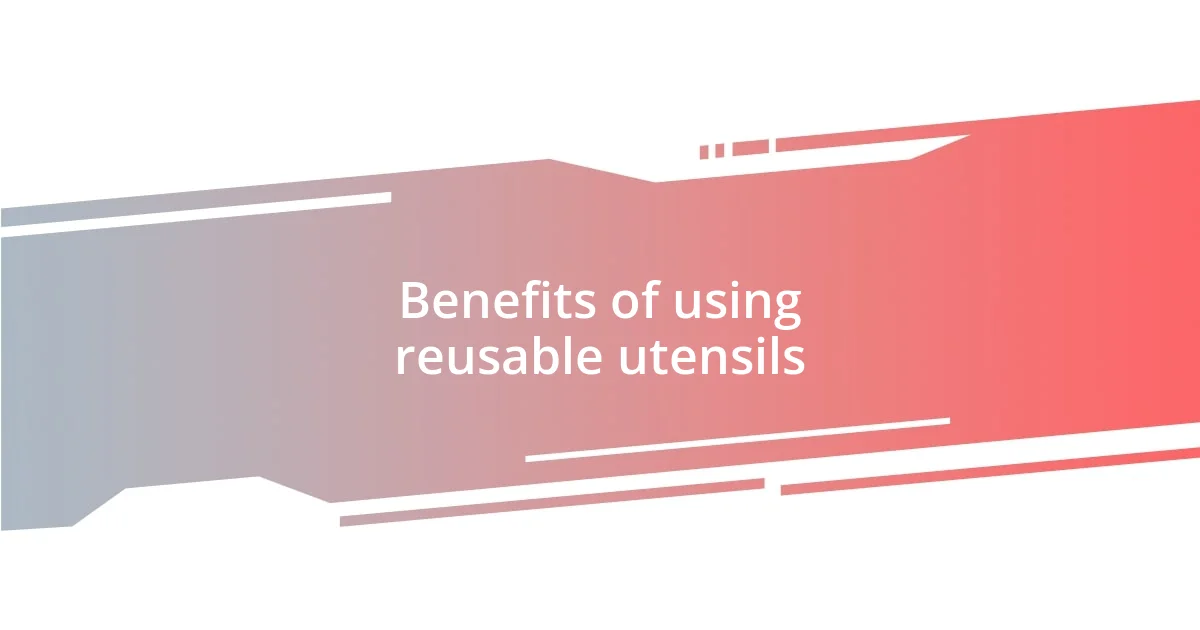
Benefits of using reusable utensils
Using reusable utensils offers a spectrum of benefits that resonate both personally and environmentally. I’ve often felt a sense of empowerment when I choose to forgo disposable options at restaurants or events. It’s moments like these that remind me of my values and commitments, impacting not just my own life but also inspiring those around me to consider their choices. The connection to my food and the environment becomes more profound with each use, as I reflect on the simple yet significant action of choosing reusable over single-use.
Here are some key benefits I’ve observed firsthand:
– Waste Reduction: The move from single-use plastics to reusable utensils can significantly cut down on trash generated during meals.
– Durability: Reusable utensils last much longer than their disposable counterparts, making them a more reliable option for any meal.
– Cost-Effectiveness: Although there is an initial investment, over time, reusable utensils save money by reducing the need for frequent purchases.
– Healthier Choices: Many reusable options are made from materials that don’t leach harmful chemicals into food, providing peace of mind during meals.
– Aesthetic Appeal: Having a stylish set of bamboo or stainless-steel utensils adds a touch of elegance to dining experiences, making them enjoyable and sophisticated.
Reflecting on a recent picnic with friends, I noticed everyone gravitating toward the vibrant colors and unique designs of my reusable forks and spoons. Their curiosity piqued conversations about sustainability, showcasing the way a simple utensil choice can foster awareness and dialogue. I find that incorporating reusable utensils into my daily routine is not just about reducing waste; it’s a lifestyle that transforms every meal into an opportunity for advocacy and connection.
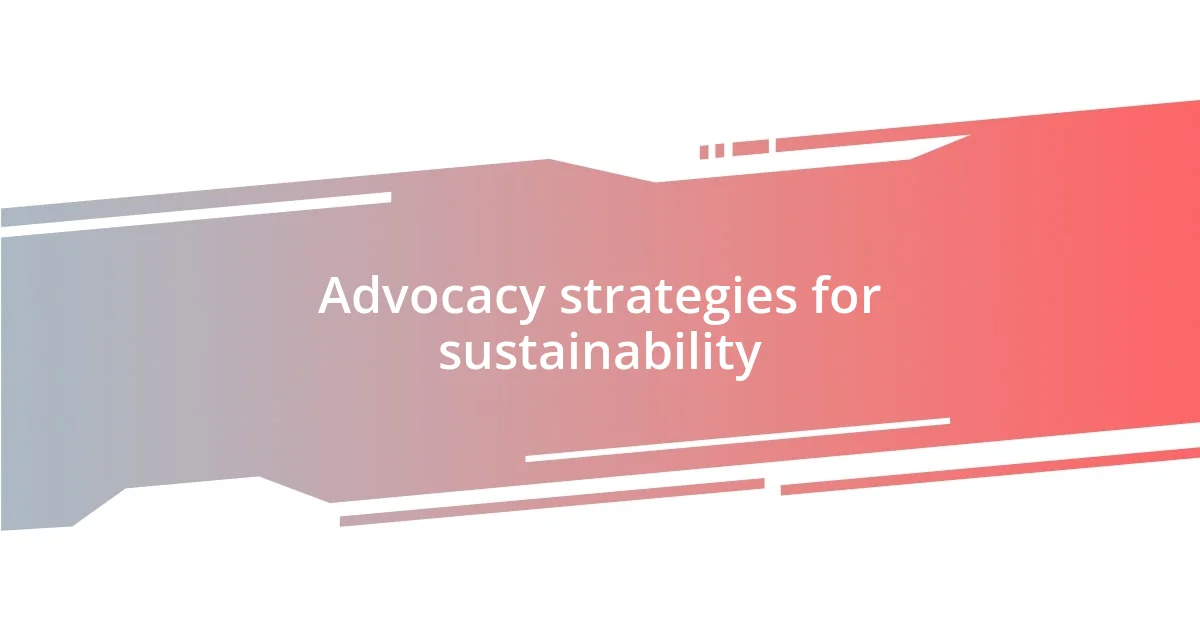
Advocacy strategies for sustainability
Advocacy for sustainability involves personal commitment and community engagement. I remember volunteering at a local farmers’ market, where we handed out reusable utensil sets to visitors. The smiles on their faces as they realized they could say goodbye to single-use plastics were unforgettable. It’s these small interactions that create ripples of change—every conversation about the benefits of reusables feels like planting a seed for future advocacy.
Educating others about the environmental impact of single-use plastics is essential. During a recent workshop, I engaged participants by asking, “What do you think happens to all those plastic utensils after they’re tossed away?” The shocked expressions as they realized the journey of waste made me realize how effectively knowledge sparks action. When people understand the consequences, they’re often inspired to make lasting changes in their habits, encouraging collective responsibility.
Creating visibility for reusable options in public spaces can also drive sustainable behavior. I initiated a “bring your own utensils” campaign at my workplace. Seeing colleagues bring their own forks and spoons transformed the lunchroom into a buzz of eco-consciousness. This shift wasn’t just about reducing waste; it fostered a culture of sustainability and shared values, reminding me how powerful advocacy can be when we act together.
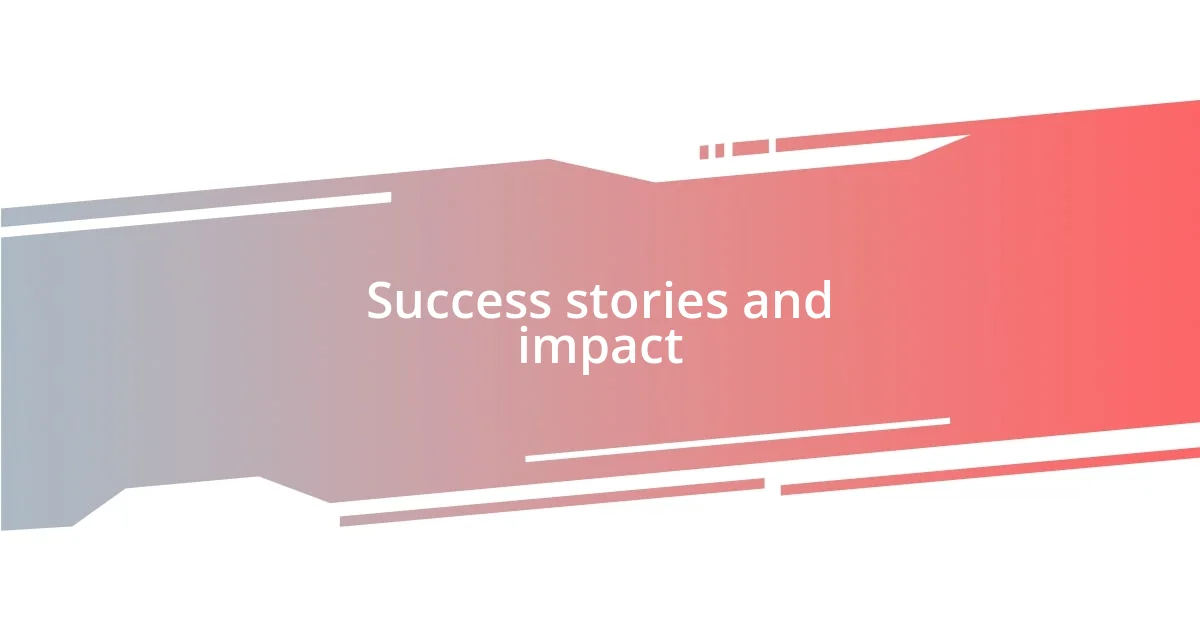
Success stories and impact
I’ve witnessed firsthand the positive outcomes of using reusable utensils in community gatherings. At a local charity event, we encouraged attendees to opt for a reusable set by offering a discount for those who brought their own. The energy in the room shifted as people engaged in conversation about their experience with disposables and the alternatives. I felt a sense of accomplishment knowing that not only were we reducing waste, but we were also cultivating a community that’s more conscious about its choices.
One story that stands out to me is when my friend decided to host a birthday party centered around sustainability. She asked each guest to bring their own reusable utensils, which sparked a lively discussion about the impact of our daily habits. As we sat around the table, surrounded by unique and colorful utensils, I couldn’t help but smile. It became more than just a meal; it turned into a shared commitment to reducing our ecological footprint, leaving an impact far greater than I had anticipated.
I often wonder, how many small changes can create a wave of transformation? When I introduced the idea of reusable utensils in my children’s school lunch program, it was heartwarming to see kids excitedly choosing their favorites. Parents shared stories about their children reminding them to pack their reusable forks and spoons. This not only empowered the next generation to think critically about waste but also strengthened our school community’s commitment to sustainability. These success stories remind me of the profound effects advocacy can have, one meal at a time.










